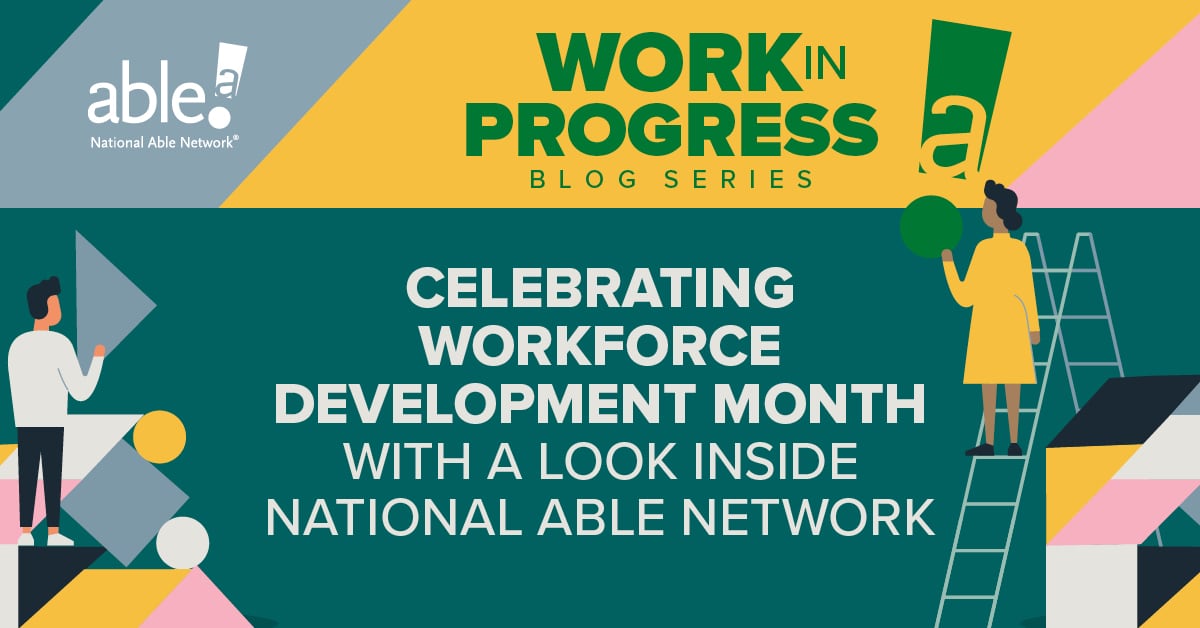When people hear the phrase “workforce development” they tend to have a vague understanding of what it means, and they have almost no impression of workforce development agencies. But organizations like National Able Network and other workforce agencies serve an important role in helping people learn new skills, launch new careers, and reenter the workforce. How exactly do these agencies work?
Broadly speaking, a non-profit workforce development agency like Able contains a programmatic team and a development team. Both teams work in tandem to advance the mission of the organization, which in our case is “Workforce Solutions and Career Pathways for an Equitable Future.”
Job seekers work with the program team to have their skills catalogued and any requests for supportive services recorded. From there, they will be enrolled into a workforce program that fits their needs. Additionally, they can participate in trainings like Able’s RemarkAble Careers program to continue their learning.
Able’s programmatic portfolio is federally-funded and includes programs like the Workforce Innovation and Opportunity Act – popularly known as WIOA – the Trade Adjustment and Assistance Program, and the Senior Community Service and Employment Program, which is the only federal employment program for senior citizens. Other programs are supported by private funding, like Able’s signature program IT Career Lab, which maintains strong partnerships with employers like Cisco and helps individuals transition into the IT industry.
Able’s programmatic portfolio is federally-funded and includes programs like the Workforce Innovation and Opportunity Act – popularly known as WIOA – the Trade Adjustment and Assistance Program (TAA), and the Senior Community Service and Employment Program (SCSEP), which is the only federal employment program for senior citizens.
These programs are expansive: every ZIP code in the United States is associated with a workforce center and job resources. These usually come in the form of American Job Centers, or AJCs, and are attuned to local economies and employers. These centers also provide connections to social services such as transportation assistance and childcare to help people overcome barriers to employment. Across the Midwest, Able is a trusted administrator of WIOA, TAA, and SCSEP.
These programs all have different areas of focus, but with one overarching goal: get people back to work. For instance, WIOA provides job seekers the opportunity to work with career coaches, receive relevant skills development training, work with staff to develop interview skills and pursue job leads, and ultimately find meaningful, sustainable employment.
The programs Able facilities get results, too. Every year, we serve 75,000 job seekers. Our clients earn an average 19% increase in annual wages and 85% launch new careers with workforce services. Chicago’s economic bottom line is boosted too: for every $1 contributed, $5.95 is put back into the local economy.
None of this work would be possible without the development team. Because Able and many other workforce development agencies are 501(c)3 nonprofits, funding is often acquired through grants.
Grants work similarly across industries, but in the workforce industry specifically they function as funding packages with clear-cut employment and upskilling goals whose funding is parsed out to programmatic providers. While the programmatic team helps clients get the support they need, the development team identifies and applies for funding opportunities to keep everything running. They might work behind the scenes, but their names always make the credits!
Lastly, but certainly not least, fostering partnerships between organizations is a cornerstone of successful workforce development agencies. Able has partnered with dozens of other community organizations to provide everything from supportive services, specialized skills training, apprenticeships, direct job placements, and more. These partnerships are essential towards creating a sustainable and effective workforce ecosystem.
Workforce development agencies do a lot more than just job placement. They are essential organizations that help ensure that anyone can launch a new career and get back to work.

